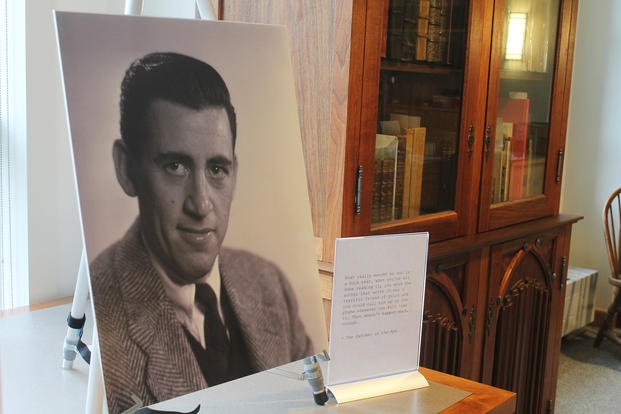J.D. Salinger was so devoted to his goal of becoming a published writer that not even the deadliest war in world history could stop him.
Drafted into the U.S. Army in 1942, Salinger served as a counterintelligence agent in the 12th Infantry Regiment, 4th Infantry Division, but "The Catcher in the Rye" author kept on writing. He was known to bring his typewriter along in his jeep, and once, when soldiers sought shelter from heavy fire, Salinger was spotted typing under a table.
World War II was considered "the transformative trauma of his life and career," according to an 2014 episode about Salinger for PBS' "American Masters" series, so it should not be surprising that what he experienced would find its way into the worlds he created.
Salinger was there when his unit came ashore at Utah Beach for the Allied invasion of Normandy in 1944, and he participated in the Battle of the Bulge and the Battle of Hurtgen Forest. But no event likely affected Salinger -- the son of a Jewish father and a Scotch-Irish mother -- more deeply than when he helped liberate the prisoners at Kaufering, part of the horrific Dachau concentration camp system, in April 1945.
"You never really get the smell of burning flesh out of your nose entirely, no matter how long you live," Salinger reportedly said, according to his daughter, Margaret, in her book, "Dream Catcher: A Memoir."

Opened in June 1944 near Landsberg, Bavaria, Kaufering was home to approximately 30,000 prisoners of war; almost all of them were Jews. Roughly half of them died from severe malnutrition, disease, ungodly work conditions or execution. Many didn't survive the death marches that POWs were subjected to. When U.S. armed forces closed in on the camp, a blaze set by the SS also killed hundreds of inmates.
What Salinger saw at Kaufering overwhelmed him. When the Germans surrendered, Salinger sat on his bed, unable to move and clutching a pistol in his hands, consumed by the thought of what it would feel like to put a bullet through his left palm.
Salinger committed himself for a mental evaluation shortly thereafter for what was considered "battle fatigue" then and what we now call post-traumatic stress disorder, or PTSD. After leaving the hospital, Salinger signed on again with the Counterintelligence Corps before he was honorably discharged in April 1946.
"The horrors of World War II spoke particularly powerfully to him," said David Shields, co-author of the book "Salinger."
Salinger met Ernest Hemingway, a war correspondent for Collier's magazine, during the liberation of Paris in August 1944. Hemingway encouraged Salinger to keep writing, and he did, completing more than 20 short stories during WWII -- some of which were eventually incorporated into 1951’s "The Catcher in the Rye."

Salinger was last published during his lifetime in 1965, but he kept on writing until his death in 2010 at the age of 91. As a result, so much of what he produced has not been exposed to public consumption.
What is out there, though, shows how much his military service impacted his writing.
Take "The Stranger", a tale of a soldier who tracks down a friend's girlfriend to inform her how he died; "Soft-Boiled Sergeant," about a drifter's indoctrination into basic training; "Last Day of the Last Furlough," which follows a soldier before he leaves for WWII; or "A Perfect Day for Bananafish", chronicling one man's feeling of isolation after coming home from war.
The nightmares that plague Sergeant X in "For Esme -- with Love and Squalor" reflect Salinger's internal turmoil during the war, according to an article by Kenneth Slawenski in Vanity Fair in 2011. And then there's "This Sandwich Has No Mayonnaise," which details Sgt. Vincent Caulfield's struggles as he copes with the news that his younger brother, Holden -- the central character and narrator of "The Catcher in the Rye" -- is missing in action and presumed dead.
"The experience of war gave his writing a depth and maturity it had lacked; the legacy of that experience is present even in work that is not about war at all," Slawenski wrote. "In later life, Salinger frequently mentioned Normandy, but he never spoke of the details -- 'as if,' his daughter later recalled, 'I understood the implications, the unspoken.'"
In "The Catcher in the Rye," Slawenski makes the connection between how WWII chiseled away at Salinger's faith and the way Holden was affected by his younger brother Allie's death, and just like the memory of dead soldiers tormented the author, Holden was similarly conflicted by going on without his brother. They both experienced a loss of innocence but later recovered, Slawenski writes.
Salinger attained the rank of staff sergeant and received five battle stars and the Presidential Unit Citation for valor during his military service. In 2019, Salinger's family announced that it expects to release his unpublished works over the next decade, so we likely have not read the last of his war stories.
-- Stephen Ruiz can be reached at stephen.ruiz@military.com.
Want to Know More About the Military?
Be sure to get the latest news about the U.S. military, as well as critical info about how to join and all the benefits of service. Subscribe to Military.com and receive customized updates delivered straight to your inbox.
















